Posts Tagged ‘Dallas Climate Change Plan’
All Plan, No Action: Dallas City Hall’s Approach to Climate Change
The most worthwhile thing that might emerge from the City’s plan is a new challenge from citizens to Business-as-Usual
Take a Deep Dive into How Dallas City Environmental Policy is Being Directed from… New York City?

Over at the Belo Mansion this morning, the City of Dallas’ Office of Environmental Quality and (Rockefeller) Sustainability is hosting a splashy PR roll-out of its council-approved “Climate Action Plan.” There’s a well-known climate scientist as luncheon headliner, and break-out sessions, and lots of food. It’s been sold out for weeks.
What there probably won’t be is an accurate recounting of how the plan came to be and an honest assessment of its severe limitations.
When the Council was voting on the plan last month City Staff were quick to point to rising public clamor over the need for this report. OEQ(R)S Director James McQuire told a reporter that what really made the Plan happen was “A change in viewpoint by Council, alignment of a department that brings together all the environmental functions of the City…and then there’s the voices of the citizens that caused this thing to get funded and started right away. I got lots of phone calls from people [City officials] saying, We had more folks come and talk about climate change planning at our budget town hall.”
And of course that scenario fits right in with the responsive, citizen-friendly customer service Dallas residents have come to expect from City Hall staff, right?
Take firm hold of those pearls and get the smelling salts ready because as it turns out, the truth is much more cynical. 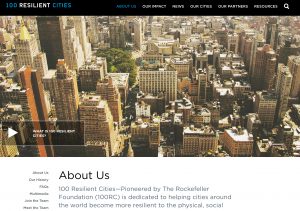
In fact, the plan was a foregone conclusion from the moment the City received a Rockefeller Foundation “Resilient Cities” grant in 2014. Municipal recipients of these grants are expected to produce such a plan. A plan exactly like the one passed by the Council in January had already been rubber stamped by an under-the-radar, Staff-selected “Community Advisory Committee” headed-up by none other than current Dallas Mayoral candidate Regina Montoya and including other Mayoral candidate Michael Solis organized three years earlier. That committee – with no one from local environmental groups as members, much less leaders – released their report last June.
As it turns out, there was a years-in-the-making, Staff-scripted path to a climate plan long before before the public clamor supposedly was just too much for the City Staff to ignore.
One obstacle remained to reaching the end of that path: how to pay the high costs of this consultant-driven plan. OEQ(R)S’s budget wasn’t large enough to absorb the $500,000 it had cost other cities like San Antonio to do the same kind of plan. Staff couldn’t bring itself to ask the Council to wring money for such an item out of the general budget. Not with Fire and Police pay so low, and pot-holed streets and such. So where could it get a cool half million for its needed pet project?
The city’s dormant plastic bag fund of over a million bucks, that’s where. Money collected from the brief period Dallas was able to charge for plastic bag use before the Council repealed the fee under pressure from Austin was still sitting around, dedicated for use for “environmental projects.” But that money had been there since 2015, and despite calls from groups and citizens for new environmental initiatives of all kinds at the city level, it had not been touched, or even mentioned by City Hall staff as a resource that could be tapped to fund those initiatives.
Until now.
With those other projects asking for money City Staff knew they wouldn’t be able to use the bag fund for their own grant-fulfilling use without a public fight. They needed a public groundswell of support to say, “By-God use that plastic bag money to fulfill the requirements of your Rockefeller grant!” It doesn’t quite have the ring of “Liberté, égalité, fraternité,” but whatever.
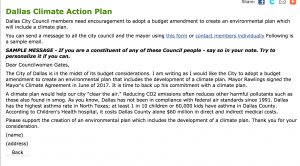 They got a mostly white middle-class version of that by calling on Dallas’ mainline green groups that all have national climate change agendas to lobby for the bag money at the August 2018 budget town hall meetings. These groups bombarded their members with messages to get out and tell their city council representatives the city had to finally take action on climate change. A significant number of them complied. This is the staff-engineered public clamor OEQ(R)S’s McQuire is alluding to in his quote above.
They got a mostly white middle-class version of that by calling on Dallas’ mainline green groups that all have national climate change agendas to lobby for the bag money at the August 2018 budget town hall meetings. These groups bombarded their members with messages to get out and tell their city council representatives the city had to finally take action on climate change. A significant number of them complied. This is the staff-engineered public clamor OEQ(R)S’s McQuire is alluding to in his quote above.
How many of those who showed-up and did the staff’s lobbying for them actually knew how inconsequential the report would be is unknown. Lost in the call for action was any real discussion of what the report would do – and more importantly for residents who want tangible local climate action measures now – what it won’t do.
There was no grassroots consensus, or even discussion, on what priorities that “found” dedicated environmental money could or should be addressing in Dallas, and whether this climate plan was its best use. There was no discussion about what concessions the broader Dallas environmental community could win from the city in return for its support.
City Staff had a self-interest in checking this box for the Rockefellers, and the national mainline groups had a self-interest in justifying their own grants. That’s how Dallas’ environmental policies ended up being decided from the East Coast, instead of you know, Dallas.
THE PLANNING PROCESS: RIGGED FROM THE BEGINNING
Our story begins way back in 2014 when Dallas City Hall’s newly-named chief “Resilience” officer, Theresa O’Donnell began recruiting members to join a special Resilience Report project. Dallas had just won a Rockefeller Foundation “Resilient City” grant that paid for her new job title. It’s the same eager-to-please reason OEQ became an awkwardly-named OEQ(R)S.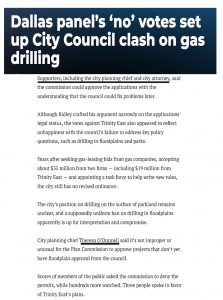
Old-timers will recognize the O’Donnell name from her role in the secret deal giving Trinity East gas drilling rights to Dallas parks and floodplains without the public, or council’s knowledge. Public disclosure of that deal sent City Manager Mary Suhm packing but Suhm minions remained in charge. O’Donnell is a Major Minion. Yes, that’s right. Dallas’ very first “Chief Resiliency Officer” advocated gas drilling in parks and floodplains against overwhelming citizen opposition.
Apparently no lessons were learned by O’Donnell from that episode except maybe to keep things more hidden from public scrutiny.
Dallas’ Resiliency Report 2014-2018
Within a year of the gas drilling debacle, she was hand-picking a committee that would ratify the “Resiliency” goals staff had already identified. O’Donnell applied a light coating of the world famous Dallas-brand Patina of Public Participation – giving the appearance without providing the real thing.
Heading up this Dallas Resilience Report effort was….Theresa O’Donnell, followed by two of O’Donnell’s employees, followed by four Muckity-Mucks from the Rockefeller Foundation, followed by “strategy partner”AECOMM, followed by 15 Dallas City Hall departments, followed by a “Steering Committee” composed of four other O’Donnell/City Hall employees, including OEQ(R)S Director James McQuire and finally someone seemingly from outside of City government – Dr. S. Marshal Isaacs, UT Southwestern Medical Center – except he’s also a city employee because among other duties he’s medical director for Dallas Fire-Rescue.
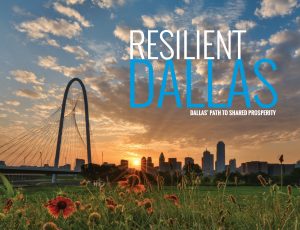
You have to make your way through 28 names before you get to any mention of Dallas citizens that have no connection to city government or the Rockefellers. That pretty much tells you who’s running the show. But just to make it crystal clear the title of the next grouping of names in the Dallas Resiliency Report is: “Community Advisory Council.” Got that? Here they are, all selected by Theresa O Donnell:
Regina Montoya, Mayor’s Task Force on Poverty (Chair)
Timothy M. Bray, Ph.D., UTD, Institute for Urban Policy Research
Richie Butler, St. Paul United Methodist Church
Teresa Jackson, Sharing Life
Mirjam Kirk, Family Gateway
Cyndy Lutz, Dallas Area Habitat for Humanity
Leonor Marquez, Los Barrios Unidos Community Clinic
Miguel Solis, Dallas Independent School District
Susan Hoff, United Way of Metropolitan Dallas
Elizabeth Sobel Blum, Federal Reserve Bank of Dallas
Dr. Baranda Fermin, Faith in Texas
Michelle Kinder, Momentous Institute
Duane Dankesreiter, Dallas Regional Chamber
Eva Szalkai Csaky, Ph.D., MSF, SMU Hunt Institute
Michael Gagne, appointed by DISD Board President
Cortney Nicolato, The Senior Source
Javier E. Olguin, Ph.D., Dallas County Community College District
Can you spot any Dallas environmentalists or grassroots groups of any kind? Neither can we. All the non-profit organizations are the traditional faith-based ones Dallas City Hall uses as their go-to pool of “community representatives.” Safe, non-confrontational, and unlikely to buck staff. Also unlikely to know a lot about the local case fo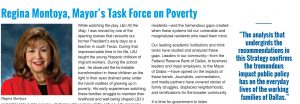 r climate change action.
r climate change action.
Whether Ms. Montoya, Mr. Solis and the other members of this Committee knew they were being used by Staff to pass their already-agreed upon agenda or just went along for the ride is unknown. Neither choice inspires confidence in her or Mr. Solis’ leadership abilities.
Next comes a gaggle of participants with the generic title of “Community Engagement,” which if you’ve seen Dallas City Hall in action probably means there were one or two well-catered lunch meetings of O”Donnell invitees who gathered to “Brainstorm” possible strategies over some excellent chicken and Brussel Sprouts..and then never saw staff again. Nevertheless, these cattle calls do result in excellent fodder for the Appendix in the report. Look, there are so many Engagers!
American Heart Association
American Institute of Architects
American Planning Association
AT&T
Atmos Energy
Brunk Government Relations Services
Building Community Resilience
Childcare Group
Children’s Health
Cities for Action
Cities for Citizenship
City University of New York Institute for State and Local Governance
Citymart
City Square
Commit Dallas
Communities Foundation of Texas
Community Council of Greater Dallas
Dallas Area Rapid Transit
Dallas Citizens Council
Dallas County
Dallas County Community College District
Dallas County Health and Human Services
Dallas County Medical Society
Dallas Faces Race
Dallas Housing Authority
Dallas Independent School District
Dallas Innovation Alliance
Dallas Regional Chamber
Dallas Women’s Foundation
Dallas Youth Commission
Dallas Truth, Racial Healing and Transformation
Dallas-Fort Worth Hospital Council
Downtown Dallas, Inc.
Earth Day Texas
Federal Reserve Bank of Dallas
Friendship-West Baptist Church
Greater Dallas Planning Council
Habitat for Humanity
Harvard Kennedy School Government Performance Lab
Health and Wellness Alliance for Children
Heritage Oak Cliff
Lyda Hill Foundation
Mayor’s LGBT Task Force
Mayor’s Task Force on Homelessness
Mayor’s Task Force on Poverty
Milken Institute School of Public Health
National Association of City and County Health Officials
Neighbor Up
New Americans Campaign
New American Economy
North Central Texas Council of Governments
North Central Texas Regional Emergency Managers Group
North Central Texas Trauma Regional Advisory Council
North Texas Commission
North Texas Fair Housing Center
North Texas Food Bank
North Texas Tollway Authority
Oak Cliff Chamber of Commerce
Oncor Electric
Parkland Center for Clinical Innovation
Parkland Health and Hospital System
Paul Quinn College
Regional Transportation Council
Revitalize South Dallas Coalition
Richardson Independent School District
San Diego State University National Center for Urban School Transformation
SMU Embrey Human Rights Program
SMU Hunt Institute for Engineering and Humanity
Society of American Military Engineers
Southern Methodist University
Southfair Community Development Corporation
Texas A&M AgriLife Research
Texas Department of Transportation
Texas Trees Foundation
Texas Workforce Solutions of Greater Dallas
The Institute for Urban Policy Research at University of Texas at Dallas
The Nature Conservancy
The Senior Source
Toyota Mobility Foundation
Trinity Park Conservancy
Trust for Public Land
U.S. Environmental Protection Agency
U.S. Green Building Council Texas Chapter
United Way of Metropolitan Dallas
University of North Texas
University of Texas at Arlington
University of Texas at Austin
UTA Center for Transportation Equity, Decisions & Dollars
Welcoming America
Welcoming Plan Task Force
Remember, these are just folks invited to brainstorming sessions, not the precious “Advisory Committee.” But not even one local professional or community environmentalist or group is included. Not even the mainline ones Staff would later use to sell the recommendation for a climate action plan to the Council. And certainly not the ones that had just helped defeat the gas drilling deals O”Donnell had advocated.
And no, EDX, the Green Buildings Council, Texas Trees Foundation, and The Nature Conservancy don’t count. EDX is a network not an advocacy group. Green Building Councils are great but those architects aren’t representing any Dallas neighborhoods, and again, not an advocacy group. The national and Austin conservation-focused groups aren’t based in Dallas or do much, if any work in neighborhoods here. One thing they do have in common is that they’re all among Theresa O’Donnell’s circle of friends in other city projects, providing her with a light green patina without having to have the real thing.
It’s really not that hard to put together a list of environmental and citizens group doing climate change work on the ground in Dallas. They’re aren’t that many, and unlike a lot of the names on that long Resiliency Report list, people have actually heard of them.
BTW, at the same time O’Donnell was tapping her nature-loving friends at the Nature Conservancy for this “engagement’ she was also lining them up for the dubious “Breathe Easy” nine school air monitoring project the city is pushing as its one and only “air monitoring project.” No public debate on whether that was the best project, no call for RFPs among the Dallas environmental scene. Just a decision made on behalf of her friends in her office.
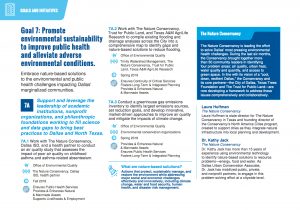
Under the mirage of manufactured consent, O’Donnell’s Resiliency Report was spit out in June of last year. It has a myriad of lofty goals including # 7: “Promote environmental sustainability to improve public health and alleviate adverse environmental conditions.”
But if like us, your mind is racing to all the things Dallas City Hall could be doing to meet that goal when you first hear it, you’ll be disappointed at the very low bar the report sets. Maybe if they’d had someone who knew abut the current “adverse environmental conditions” in the city it would have helped.
Recommendation #1. “Work with The Nature Conservancy, Dallas ISD, and a health partner to conduct an air quality study that assesses the impact of poor air quality on childhood asthma and asthma-related absenteeism. Office of Environmental Quality, The Nature Conservancy, and Dallas ISD, Fall 2018.”
Nobody from outside the O’Donnell bubble is involved. The projects, down to the specific organizations, have already been decided by staff. Like clockwork this project hit the Council in the fall of 2018 and is underway.
We’re sure this project sounded like a splendid idea to everyone on the Advisory Committee and among the (barely) Engaged. Unbeknownst to them there were other options available to Dallas for more widespread and useful air monitoring research but nobody got to hear those because they were being sponsored by what staff described as “biased groups,” i.e. grassroots groups like Downwnders at Risk who’ve been hostile to the staff over its advocacy of pollution permits in West and South Dallas. Only those groups who are in agreement with City Hall staff are allowed for consideration in formulating city policies. Much tidier that way.
Recommendation #2. “Work with The Nature Conservancy, Trust for Public Land, and Texas A&M AgriLife Research to compile existing flooding and drainage analyses across the City into a comprehensive map to identify gaps and nature-based solutions to reduce flooding.”
See a pattern? But you’re really here for this:
Recommendation 3. “Conduct a greenhouse gas emissions inventory to identify largest emissions sources, set reduction goals, and develop innovative, market-driven approaches to improve air quality and mitigate the impacts of climate change. Spring 2018.”
A Dallas climate plan was so far along inside City Hall by last spring that O’Donnell’s Resiliency Report in June of 2018 could confidently report it as a done deal. (And BTW, that was it. They could only think of three ways to “Promote environmental sustainability to improve public health and alleviate adverse environmental conditions in Dallas.”)
But please note the climate plan didn’t go before the Council in the spring of 2018, or the summer, or the fall. It was January 2019 until this “done deal” made it for a final Council vote. Why? Because it wasn’t done. Staff needed to figure out a way to pay for it.
And suddenly that’s when the mainline green groups they’d previously ignored became important to them. However much they talked up the Nature Conservancy, they knew it didn’t represent Dallas environmentalists and could not pull off the kind of sales job they needed. As a result, the Staff helped engineered the “public outcry” they later cited as a reason for passing the plan.
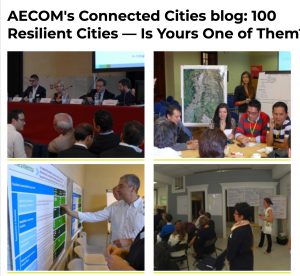 Oh, and the company that got the contract for drafting Dallas’ climate action plan? It was Theresa O’Donnell’s old “strategy partner” AECOM, a consulting firm spun off from…wait for it…oil giant Atlantic Richfield. Yes, that’s right. Dallas’ climate plan is being written by a firm founded as a subsidiary of one of the world’s fossil fuel giants.
Oh, and the company that got the contract for drafting Dallas’ climate action plan? It was Theresa O’Donnell’s old “strategy partner” AECOM, a consulting firm spun off from…wait for it…oil giant Atlantic Richfield. Yes, that’s right. Dallas’ climate plan is being written by a firm founded as a subsidiary of one of the world’s fossil fuel giants.
Now that it really is a done deal, there are at least two important questions to ask of this Dallas climate planning process:
1) What will it actually deliver to the public and Council?
and,
2) What’s the process for “community engagement” from now to release of the plan next year?
INVENTORYING THE DELIVERABLES
What will Dallas get for $500,000?
One thing it will not get is any immediate action on any item that could reduce climate change pollution.
As the plan was being sold to the public and Council, some extreme claims were made about its impact. One advocate stated that “This plan will have huge positive health impacts, saving lives and improving our quality of life. It will make Dallas a better place to live and work, and more attractive to new and clean businesses and jobs, all while reducing Dallas’s greenhouse gas emissions and putting Dallas in the ranks of other world-class cities doing so.”
No it won’t. It can’t do any of that. It can recommend measures that might produce those results, but the report is specifically designed NOT to set in motion any specific policy change on any specific timeline.
It only does two things:
1. Estimate the amount of very specific climate change gases (not even all air pollution) coming from City of Dallas operations, and then tries to do the same thing for the entire City of Dallas.
2. Make recommendations for measures to reduce climate change emissions from municipal and community sources and/or mitigate their impact.
If they’re any good, those recommendations will then need to find a sponsor on the City Council and have at least seven other Council allies willing to pull the trigger. None of that is guaranteed to happen. You could have a report whose worthy goals are disowned by a majority of the Council for years.
In its own anti-climatic words, here what staff says itself about the end results of the plan:
• Use GHG emissions inventory data in development of Comprehensive Environmental Climate Action Plan (CECAP)…. building on the Resilient Dallas plan…
• Continue to encourage City emissions reduction initiatives and conduct emissions monitoring.
Town Hall passions of the advocates outstripped the reality of what this plan can do on its current course.
Any of the environmental groups Theresa O’Donnell hasn’t invited to participate to date could give you a good list of climate change action items right now – free of charge. Again, not that hard since there’s a known universe of options already from the half-dozen or so previous climate plans other cities have produced – courtesy of AECOM and their consulting brethren, who’ve been only too happy to charge officials for some of the most expensive photocopy jobs in history.
SAN ANTONIO EXAMPLE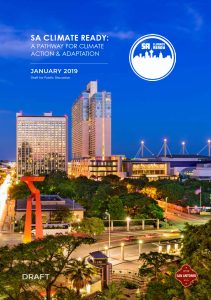
And now there’s some proof those groups’ lists for Dallas City Council climate change action items really would likely be more aggressive and transformative than any list AECOM is likely to produce next year: San Antonio.
San Antonio is to Dallas on climate change as Dallas is to San Antonio on shopping. They’re in whole other leagues.
San Antonio has a progressive mayor who’s made climate change a big local issue. They were out in front before any other major Texas city. The city’s public utility company committed $500,000 two years ago to pay for a climate plan that does the same thing Dallas’ will do. The process there included dozens of community activists who did actually know something about the local “adverse environmental conditions.” Its climate plan was written by a consultant not named AECOM. San Antonio has won all kinds of awards for being pro-active on climate change, including a huge Bloomberg Foundation grant, one of only 25 given to American cities.
Time and again during the push in Dallas to get a local climate plan going, San Antonio was the example being used. They did it right in the Alamo City, we were told. We need to follow their lead.
And yet the final San Antonio plan, recently released, is being criticized by those same mainline groups that advocated Dallas going down exactly the same path only last month.
“The draft SA Climate Ready plan is out and its not what we hoped for. It’s time for San Antonio residents to speak up and demand real action to reduce greenhouse gas emissions at a pace that will preserve a livable climate.”
Examples of disappointment in the report abound. While Chinese cities enjoy full electric transit fleet service in 2019, and Los Angles, Vancouver and other cities have pledged to do the same by 2035, the San Antonio consultant wants to give the city until 2050. Other equally uninspiring options follow. Any climate change organizer could have done better.
So yes, by all means, let’s follow San Antonio’s lead and produce a report that doesn’t deliver desperately needed urgent recommendations or timelines.
But of course these are exactly the kind of feel-good, not-too-challenging goals Dallas City Hall loves to publicize…and then forget about. What will keep the climate plan process in Dallas from producing the same bromides, especially given how it was created?
Maybe the folks that weren’t invited to the table finally come knocking at the door.
THE PROCESS FROM THIS POINT FORWARD
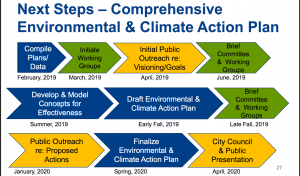
According to the Staff’s timeline, they’re already beginning to decide how to form what they’re calling “Working Groups” to consult with the consultant. How will the membership of these Working Groups be decided, and by whom? At a recent community networking meeting where an OEQ(R)S staffer showed-up, he couldn’t answer those questions. But let’s pretend we’re Theresa O’Donnell. Who might she invite from the environmental side of things?
The Nature Conservancy for sure. The Trees Foundation. EDX. Those are givens. Next comes mainline green groups who won her the support she needed to take money from the City’s only dedicated environmental fund.
Anyone after those usual suspects? What about representatives from local groups most impacted by climate change and adverse environmental conditions now? The Joppa Freedmans’s Township Association, West Dallas One, The Highland Hills Community Group forming around the Lane Plating Superfund site, North Texas Transit Riders, The 10th Street District, Inclusive Communities Project, NAACP Health Committee, Society of Native Nations, Beyond Coal/Dallas? And maybe the leading clean air group in DFW for 25 years? Don’t hold your breathe.
Besides deciding the membership of the plan’s Working Groups by spring, there’ll be some of those “brainstorming sessions” and then a back and forth in the process between consultants and Working Groups that lasts up until the plan’s scheduled release in April of next year (to be unveiled at that 2020’s EDX no doubt). These Working Groups will be the crux of the public participation part of the plan.
What kind of decision is made is determined by how that decision is made and who makes it. The first sign of whether Dallas new climate plan will follow Old Dallas ways is how the staff picks who’s eligible to serve on those Working Groups.
INJECTING “EQUITY” INTO THE PROCESS
Regardless of who staff names to the official process, the groups that have the most to lose from climate change might want to intervene in its drafting, with or without an invitation.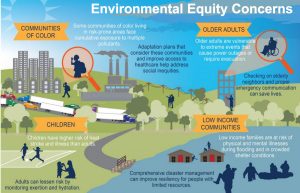
That’s because besides the contortion of titles it causes cities who get their grants to go through, the Rockefeller “Resilient Cities” effort puts a lot of rhetorical emphasis on “equity.”
This is why, even as the OEQ(R)S officially approves new industrial sites in West and South Dallas one after another, it then sends staffers to community meetings to speak about the need to reduce the number of black kids with asthma. It now must tow the Rockefeller “equity” line, in words if not deeds.
Job One in O”Donnell’s Resilient City Report was to “Advance equity in City government” and recommended partnering “with anchor institutions and community-based efforts to advance equity initiatives across Dallas by recognizing and reconciling a history of inequity and fostering communication of social differences between diverse communities and individuals.”
Disparities in Dallas pollution burdens are certainly one of the variables that can impact a neighborhood’s quality of life. But so far the city has gone out of its way to exclude the groups and individuals who suffer from those disparities and/or work on their behalf to address them.
Residents may have a chance to change that behavior. Environmental Justice, aka “Equity” is now a rhetorical challenge for Dallas to live up to in order to justify its Rockefeller money. Future grants and job titles could be imperiled if Dallas isn’t seen as being responsive enough to its Black and Brown populations. That gives citizens who want real reform some leverage with they don’t usually have.
Who do the crop of Mayoral and Council candidates, including Ms. Montaya and Mr. Solis, think should be represented in those climate plan Working Groups? Who are the incumbent council members recommending for membership on those Working Groups? Are they even being asked? What should the Working Group agendas be? What effective, real, climate change responses can we do right now without waiting for a plan to come out in a year and tell us?
Despite its business-as-usual origins, this climate planning process is still an opportunity to test just how “equitable” Dallas politics and City Hall really want to be. But it’s up to residents themselves to administer that test.
Otherwise this time next year all Dallas will likely have to show for its $500,000 is another splashy roll out.
